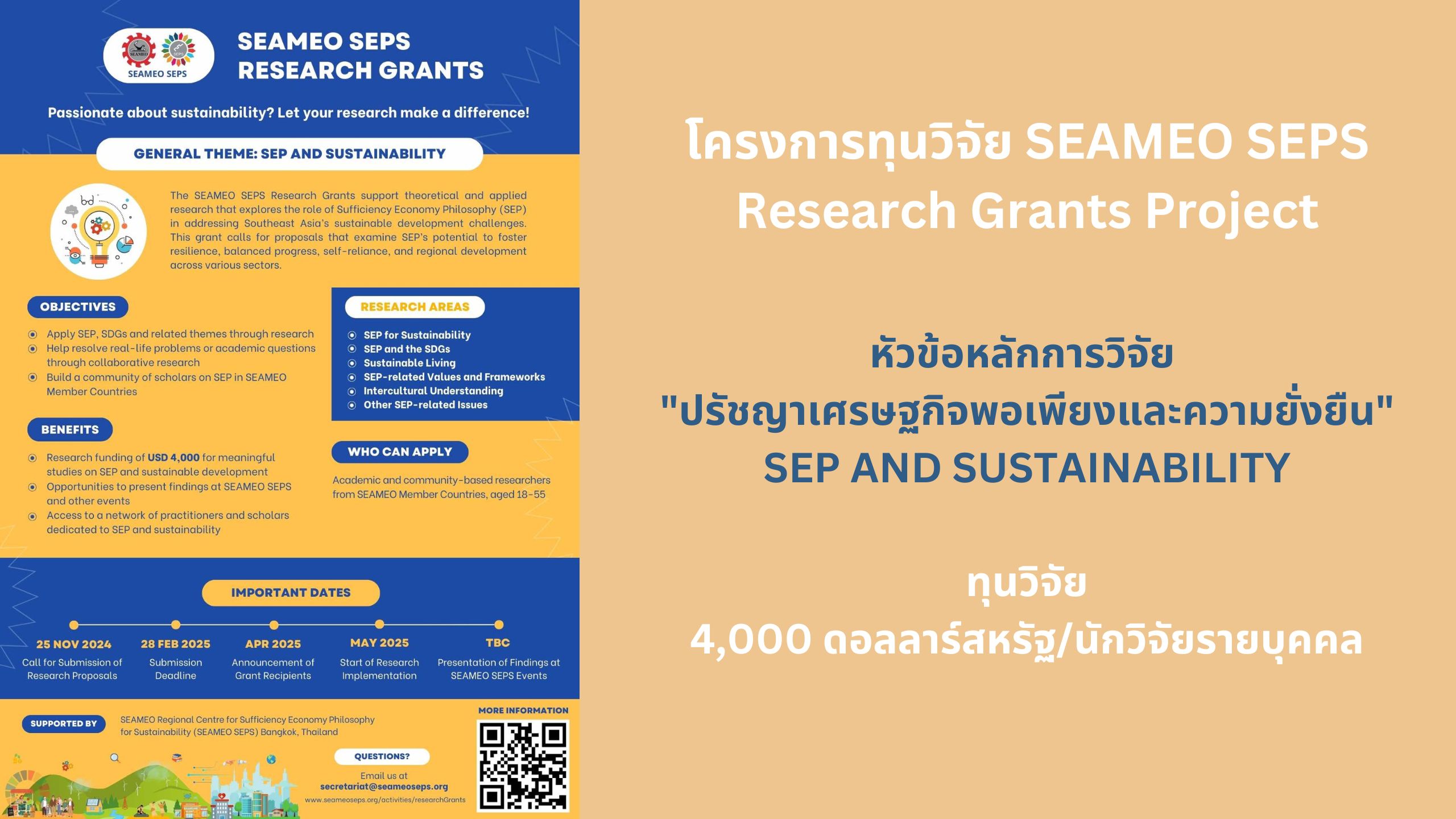
SEAMEO SEPS RESEARCH GRANTS 2024
SEAMEO SEPS Research Grants
- How SEP supports long-term sustainability practices across different sectors.
- SEP's contributions to promoting Sustainable Living at the community or national level, fostering economic resilienceand thriving within their environmental limits.
- Aligning SEP with the achievement of the Sustainable Development Goals (SDGs) in Southeast Asia.
- Exploring other Values and Frameworks similar to SEP that enhanceequitable development.
- How SEP fosters Intercultural Understanding and Related issues inthe context of sustainability.
Expected Outcomes and Outputs
The following are the anticipated benefits of the research funded by the SEAMEO SEPS Research Grants. These outcomes need to be outlined in the grant proposal to demonstrate the potential impact of the research and to justify the need for funding.
a. Knowledge base on Sufficiency Economy Philosophy and related themes is increased, and is made accessible to stakeholders
b. Opportunities to promote Sufficiency Economy Philosophy outside Thailand is expanded
c. Research collaborators and advocates on Sufficiency Economy Philosophy are identified and networked.
The following are examples of outputs that would be beneficial both for academic development and practical applications.
a. Journal articles, research papers, and manuscripts summarising the key findings about the Sufficiency Economy Philosophy, its relevance, and its application in various contexts.
b. Online platforms, repositories, or databases where stakeholders (e.g., policymakers, educators, practitioners) can access research on Sufficiency Economy Philosophy.
c. Educational modules and online courses designed to increase awareness and understanding of Sufficiency Economy Philosophy for a broad audience.
d. Policy recommendations on the adoption or adaptation of Sufficiency Economy Philosophy in local, national, or global contexts, particularly in sustainable development and governance.
e. Establishment of partnerships with international or regional universities, research institutions, and organisations that can help promote Sufficiency Economy Philosophy in various countries.
f. International conferences, webinars, or symposiums where Sufficiency Economy Philosophy can be presented, discussed, and promoted among global or regional stakeholders.
g. Projects and studies comparing the application of Sufficiency Economy Philosophy in different cultural and economic contexts to assess its potential scalability.
h. Documents that explore the potential of Sufficiency Economy Philosophy as a global framework for sustainable development and economic resilience in various international settings.
i. Research networks or consortia of academics, NGOs, and government organisations working together on Sufficiency Economy Philosophy-related topics.
j. Initiatives to spread the word about Sufficiency Economy Philosophy, including advocacy materials, social media campaigns, and events that engage global or regional audiences and raise awareness about its importance and practical applications.
These outputs would be helpful in disseminating knowledge of Sufficiency Economy Philosophy, fostering international or regional collaboration, and creating real-world impacts from the research into sustainable development practices. Research grants could be used to fund the setup for these outputs, making them both accessible and actionable for a wide variety of stakeholders.
Who Can Apply?
- A national of one of the SEAMEO Member CountriesBetween 18 and 55 years of age at the time of application
- Proficient in the English language
- Not employed/contracted by any of SEAMEO Centres and Network, or by SEAMEO Secretariat
- Not a previous recipient of any SEAMEO grant for the past 3 years
Benefits of Grant Recipients
- USD 4,000 research funding for meaningful studies on SEP and sustainable development
- Opportunities to present findings at SEAMEO SEPS and other events
- Access to a network of practitioners and scholars dedicated to SEP and sustainability
Important Dates
| Activities | Schedule |
|---|---|
| • Call for submission of research proposals | 25 November 2024 |
| • Period for submission of proposals | 25 November 2024 to 28 February 2025 |
| • Deadline for proposal submission | 28 February 2025 |
| • Entry evaluation, shortlisting, and selection | 1 March 2025 to 30 April 2025 |
| • Announcement of grant recipients | 30 April 2025 |
| • Start of research implementation | 1 May 2025 |
| • Presentation of findings at SEAMEO SEPS and other events | TBC |
Contact Person
Ms Abigail Lanceta
Email: l.abigail@seameoseps.org
cc research@seameoseps.org
Download
